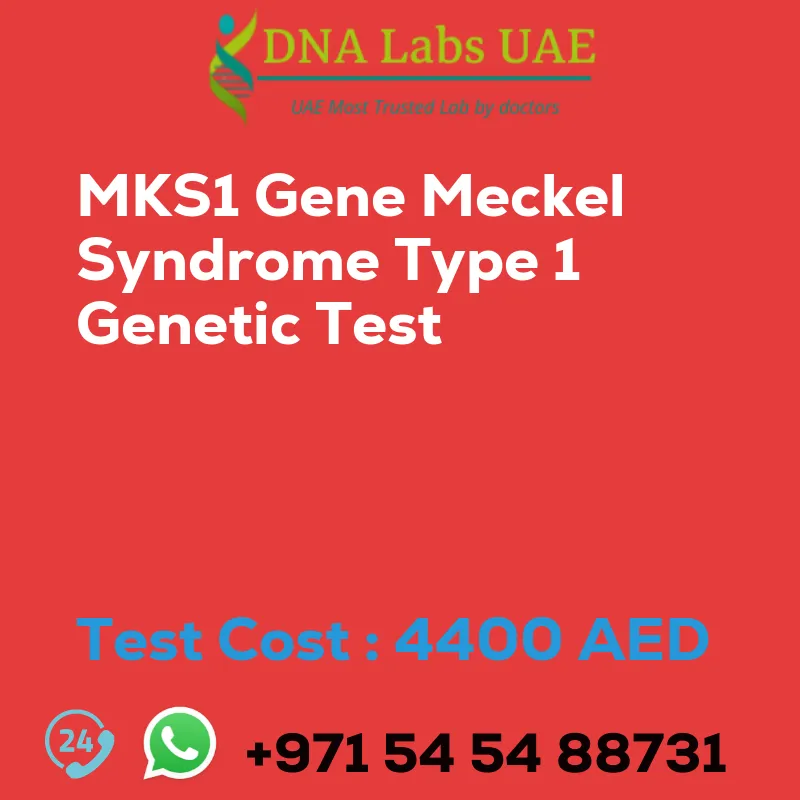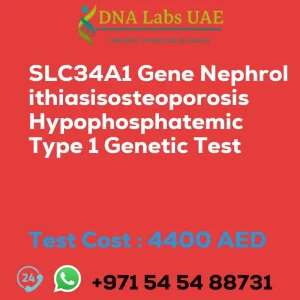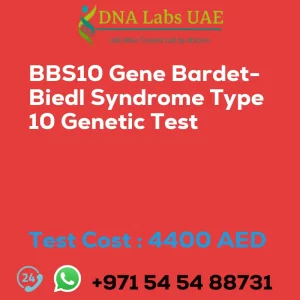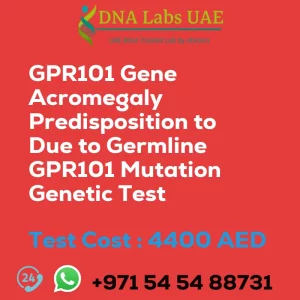MKS1 Gene Meckel Syndrome Type 1 Genetic Test
Components:
- Test Name: MKS1 Gene Meckel syndrome type 1 Genetic Test
- Price: 4400.0 AED
- Sample Condition: Blood or Extracted DNA or One drop Blood on FTA Card
- Report Delivery: 3 to 4 Weeks
- Method: NGS Technology
- Test Type: Hepatology Nephrology Endocrinology Disorders
- Doctor: General Physician
- Test Department: Genetics
Pre Test Information:
Clinical History of Patient who is going for MKS1 Gene Meckel syndrome type 1 NGS Genetic DNA Test. A Genetic Counselling session to draw a pedigree chart of family members affected with MKS1 Gene Meckel syndrome type 1 NGS Genetic DNA Test gene MKS1.
Test Details:
The MKS1 gene is associated with Meckel syndrome type 1 (MKS1), which is a rare genetic disorder characterized by multiple abnormalities affecting various organs and systems in the body. MKS1 is one of the genes involved in the development of cilia, which are hair-like structures involved in cell signaling and movement.
NGS (Next-Generation Sequencing) genetic testing is a type of genetic testing that uses high-throughput sequencing technologies to analyze multiple genes simultaneously. In the context of Meckel syndrome type 1, NGS genetic testing can be used to identify mutations or variations in the MKS1 gene, which can help confirm a diagnosis of the condition. NGS genetic testing for MKS1 may involve sequencing the entire coding region of the gene or specific regions of interest, depending on the specific test being used.
The test can be performed on a blood or saliva sample, and the results are typically interpreted by genetic specialists who can provide information about the significance of any identified genetic variants. It’s important to note that genetic testing for MKS1 is typically recommended for individuals with a suspected or confirmed diagnosis of Meckel syndrome, as it is not a routine test performed in the general population.
The test can help provide information about the underlying genetic cause of the condition, which can be helpful for understanding the inheritance pattern and providing appropriate genetic counseling for affected individuals and their families.
| Test Name | MKS1 Gene Meckel syndrome type 1 Genetic Test |
|---|---|
| Components | |
| Price | 4400.0 AED |
| Sample Condition | Blood or Extracted DNA or One drop Blood on FTA Card |
| Report Delivery | 3 to 4 Weeks |
| Method | NGS Technology |
| Test type | Hepatology Nephrology Endocrinology Disorders |
| Doctor | General Physician |
| Test Department: | Genetics |
| Pre Test Information | Clinical History of Patient who is going for MKS1 Gene Meckel syndrome type 1 NGS Genetic DNA Test. A Genetic Counselling session to draw a pedigree chart of family members affected with MKS1 Gene Meckel syndrome type 1 NGS Genetic DNA Test gene MKS1 |
| Test Details |
The MKS1 gene is associated with Meckel syndrome type 1 (MKS1), which is a rare genetic disorder characterized by multiple abnormalities affecting various organs and systems in the body. MKS1 is one of the genes involved in the development of cilia, which are hair-like structures involved in cell signaling and movement. NGS (Next-Generation Sequencing) genetic testing is a type of genetic testing that uses high-throughput sequencing technologies to analyze multiple genes simultaneously. In the context of Meckel syndrome type 1, NGS genetic testing can be used to identify mutations or variations in the MKS1 gene, which can help confirm a diagnosis of the condition. NGS genetic testing for MKS1 may involve sequencing the entire coding region of the gene or specific regions of interest, depending on the specific test being used. The test can be performed on a blood or saliva sample, and the results are typically interpreted by genetic specialists who can provide information about the significance of any identified genetic variants. It’s important to note that genetic testing for MKS1 is typically recommended for individuals with a suspected or confirmed diagnosis of Meckel syndrome, as it is not a routine test performed in the general population. The test can help provide information about the underlying genetic cause of the condition, which can be helpful for understanding the inheritance pattern and providing appropriate genetic counseling for affected individuals and their families. |








